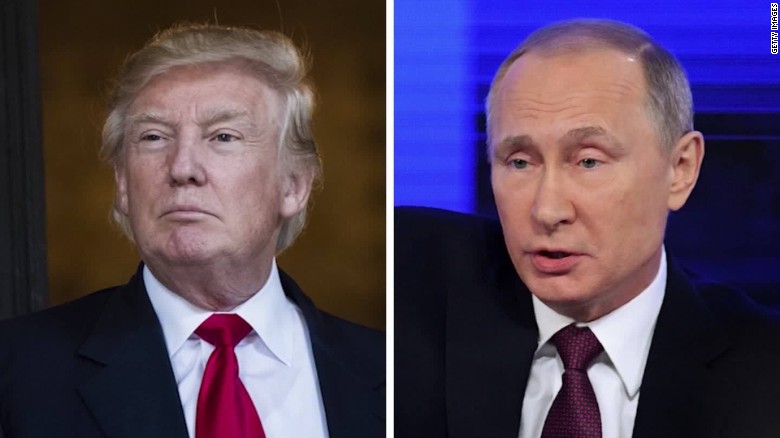The Trump Presidency And The Evolving Response To Russia's Actions In Ukraine

Table of Contents
Trump's Pre-Presidential Stance and Early Actions Towards Russia
Campaign Rhetoric and Promises
Trump's campaign rhetoric regarding Russia, Vladimir Putin, and Ukraine signaled a potential departure from traditional US foreign policy. His statements frequently expressed a desire for improved relations with Russia, sometimes at the expense of established alliances. This included questioning the relevance and value of NATO, a cornerstone of Western security architecture since the Cold War. Simultaneously, his statements about Ukraine often lacked the unequivocal support for its sovereignty and territorial integrity demonstrated by previous administrations.
- Publicly praising Putin's leadership.
- Expressing skepticism about the extent of Russian interference in the 2016 US election.
- Suggesting a willingness to reconsider sanctions imposed on Russia following its annexation of Crimea.
- Raising doubts about the efficacy and necessity of NATO's collective defense mechanism.
Initial Responses to Russian Actions in Ukraine
The early days of the Trump administration witnessed a period of uncertainty regarding the US response to ongoing Russian aggression in Ukraine. While sanctions remained in place, their enforcement and the overall tone regarding Russian actions differed significantly from the Obama administration's approach. The level of military aid to Ukraine also became a point of contention, fueling concerns about a potential weakening of US support for the embattled nation.
- A perceived reluctance to publicly condemn Russian actions in Crimea and the Donbas region.
- Debate surrounding the provision of lethal aid to Ukraine, initially hesitant and then ultimately approved in a more limited capacity.
- A lack of strong, consistent messaging regarding the importance of respecting Ukrainian sovereignty and territorial integrity.
Key Events and Policy Decisions During the Trump Presidency
The Mueller Investigation and Russia's Interference
The Mueller investigation into Russian interference in the 2016 US election cast a long shadow over the Trump administration's Ukraine policy. The investigation's findings, detailing extensive Russian efforts to influence the election, created an unavoidable backdrop to all foreign policy decisions, especially those involving Russia. Accusations of collusion and potential obstruction of justice further complicated the situation, potentially affecting the administration's ability to take decisive action against Russia.
- The investigation's findings directly impacted public perception of the administration's credibility on Russia-related issues.
- Potential political constraints on the administration's ability to implement a robust response to Russian aggression.
- Internal divisions within the administration regarding the appropriate response to Russian actions.
The Summits with Putin
Trump's multiple summits with Putin generated significant attention and raised concerns about potential concessions on Ukraine. The lack of transparency surrounding these meetings, combined with Trump's generally positive public remarks about Putin, fueled speculation that the administration was prioritizing improved US-Russia relations over addressing Russian aggression in Ukraine.
- A lack of clear public pronouncements on Ukraine following these summits.
- Concerns that Trump's personal relationship with Putin overshadowed the strategic interests of Ukraine and the US.
- Limited tangible outcomes related to de-escalation in Ukraine following the summits.
Military Aid and Sanctions
The Trump administration's approach to military aid and sanctions against Russia was characterized by inconsistencies and periods of apparent hesitation. While some military aid was provided to Ukraine, concerns remained about the adequacy of this support compared to previous years. Similarly, the enforcement and scope of sanctions against Russia were at times criticized as insufficient to deter further aggression.
- Fluctuations in the level of military aid provided to Ukraine, sometimes exceeding previous levels, and at other times falling short.
- Allegations of slow or inadequate enforcement of existing sanctions against Russia.
- Controversy surrounding potential delays or obstacles in providing specific types of military equipment to Ukraine.
The Impact of Trump's Approach on NATO and International Relations
NATO's Unity and Resolve
Trump's frequent questioning of NATO's value and relevance significantly impacted the alliance's unity and resolve in responding to Russian actions. His rhetoric, coupled with perceived inconsistencies in US support, sowed doubts among allies about the reliability of the US security guarantee, potentially weakening NATO's collective defense capability.
- Statements criticizing NATO allies for not contributing "enough" financially.
- Uncertainty among European allies regarding the US commitment to collective defense.
- Potential erosion of trust and interoperability within the NATO alliance.
Relations with European Allies
Trump's approach to Russia and Ukraine strained relations with several key European allies. While there was cooperation on certain aspects of the response to Russian aggression, disagreements over the appropriate approach and level of engagement frequently surfaced, highlighting divisions within the transatlantic community.
- Disagreements over the appropriate balance between dialogue and pressure regarding Russia.
- Concerns among European allies about the potential consequences of a more conciliatory approach towards Russia.
- The emergence of diverging views on the efficacy of sanctions and military aid to Ukraine.
Conclusion
The Trump presidency's approach to Russia's actions in Ukraine marked a significant departure from previous administrations. While the administration's exact long-term impact is still being assessed, the analysis above highlights the complexities of the response, including inconsistencies in messaging, the influence of domestic political considerations, and the resulting challenges to international cooperation. Understanding the interplay between these factors provides crucial context for future responses to Russian aggression and for strengthening a more consistent and effective approach to managing such crises. Further research into the long-term consequences of these policies is essential to developing a robust strategy for dealing with future threats to Ukraine's sovereignty and broader international stability. Continued analysis of the Trump presidency and the evolving response to Russia's actions in Ukraine is crucial to informing future foreign policy decisions.

Featured Posts
-
 Islanders Claim First Overall Pick In Nhl Draft Lottery
May 13, 2025
Islanders Claim First Overall Pick In Nhl Draft Lottery
May 13, 2025 -
 Atalanta Lecce Sigue La Fecha 34 De La Serie A En Vivo Online
May 13, 2025
Atalanta Lecce Sigue La Fecha 34 De La Serie A En Vivo Online
May 13, 2025 -
 Hostage Fathers Message Of Strength To His Son
May 13, 2025
Hostage Fathers Message Of Strength To His Son
May 13, 2025 -
 1
May 13, 2025
1
May 13, 2025 -
 Unexpected Netflix Addition A Scarlett Johansson And Chris Evans Comedy
May 13, 2025
Unexpected Netflix Addition A Scarlett Johansson And Chris Evans Comedy
May 13, 2025
